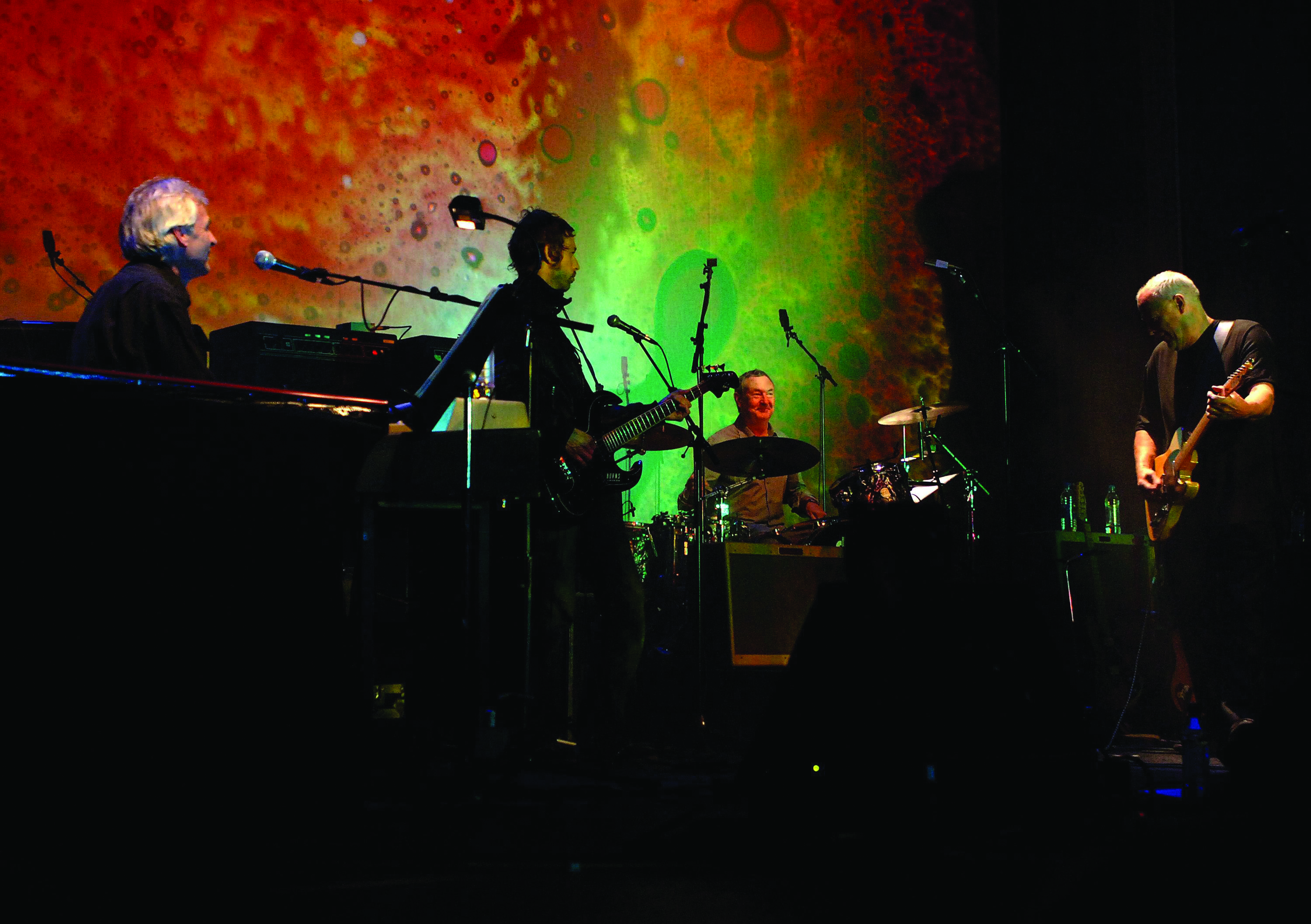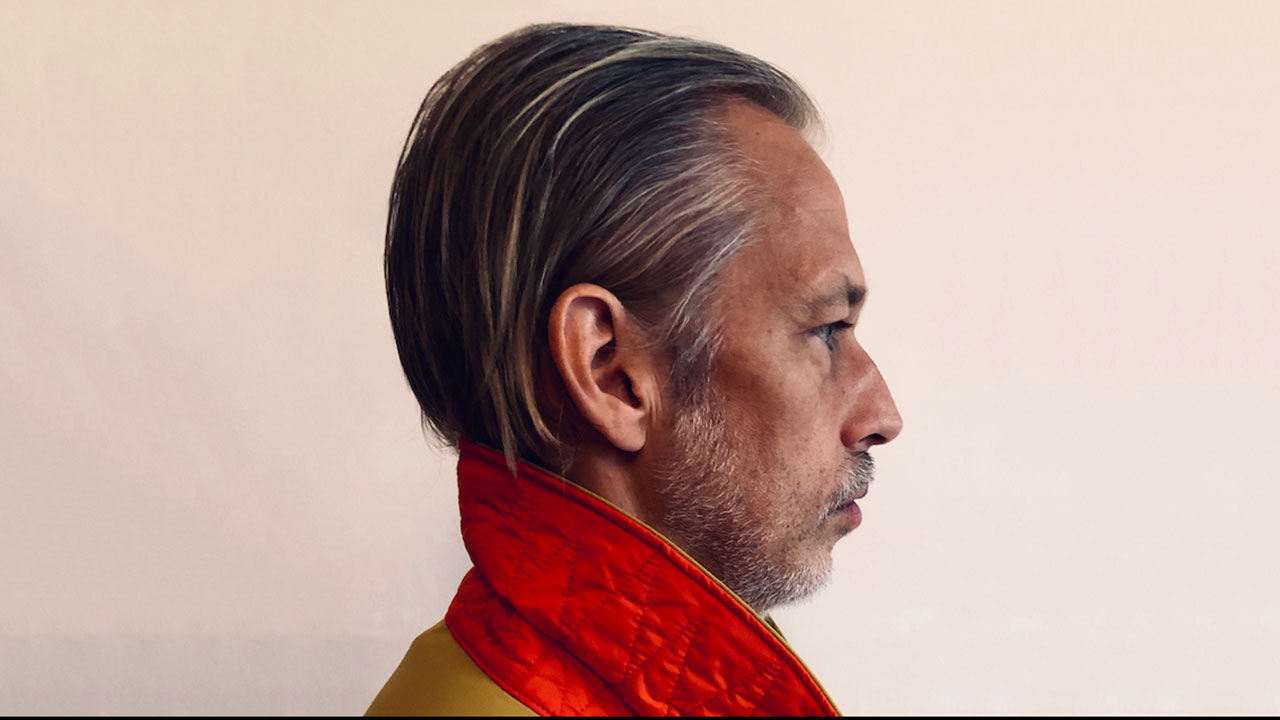Andy Bell answered a knock on his door the other day. There stood Pink Floyd’s manager, who gifted him a copy of the Record Store Day 2020 single, Arnold Layne Live 2007. Not only was it a wholly unexpected surprise, but it also brought back vivid memories of a treasured moment in Bell’s career.
In May 2007, a host of big names gathered at London’s Barbican Hall for The Madcap’s Last Laugh, a tribute gig in honour of Syd Barrett, who’d passed away the previous year. The surviving members of Pink Floyd were there, as were special turns Kevin Ayers, John Paul Jones, Robyn Hitchcock, Damon Albarn, Chrissie Hynde and Captain Sensible. To close proceedings, Pink Floyd reunited (minus Roger Waters) to play Arnold Layne, the single that sent the original line-up on its way some 40 years earlier.
Bell happened to be onstage with them that night. “It was the greatest thing ever,” he recalls. “I’d been called in to play bass in the house band for the concert. Nick Laird-Clowes from The Dream Academy was the bandleader and we became the musical core for all the guests. During our final rehearsal, this guy close to the Floyd camp had popped his head in to listen to us. The next morning I got a call from Nick, who told me that the Floyd really approved of what was going on and wanted to do a tune: ‘Roger is going to be there, but he won’t play with them. So will you be Roger?’ I didn’t even hesitate.”
Bell didn’t actually meet the band until the first half of the show was complete. “I got pulled into a side room at the Barbican and they were all in there,” he continues. “David Gilmour had his Strat unplugged and turned to me: ‘We’re just making sure you know what we’re going to do here. Let’s run though it quickly.’ What was really cool onstage was that Nick [Mason] didn’t count in the song with his sticks. Instead, David Gilmour walked over to me and went [in an impossibly polite voice]: ‘One, two, three, four…’ It was all done in this lovely, very English way.”

Performing with Pink Floyd is just one side of the lesser-known Andy Bell. This is, after all, someone chiefly known as guitarist with 90s shoegaze types Ride. And, later, bassist with Oasis and guitarist in Liam Gallagher’s Beady Eye. But when he wasn’t packing out stadiums with those bands, you’d find him playing guitar for obscure electro-house artists in Sweden. Or popping up on recordings by acid jazz outfit Mother Earth. Or, as he did in 2010, adding drones to pieces by London spaceheads SPC ECO. There’s even his alter ego, GLOK, under whose banner he released 2019’s pulsing Dissident.
Named after a misspelling of the German word for bell, GLOK was a repository for his love of all things experimental and electronic. Bell fused elements of minimalism, soundtrack work and ambient techno to create something quietly spectacular. It’s easy to discern the influence of bands like Neu!, Can and Tangerine Dream amid GLOK’s otherworldly soundscape. “I suppose a lot of that’s like German prog,” he ponders. “I’m partial to the odd 20-minute track myself, so there’s definitely a love for that music in there. I actually like a lot of stuff that you’d label prog: Aphrodite’s Child, Mighty Baby and krautrock of course.”
Now comes the first solo album under Bell’s own name. Four years in the making, The View From Halfway Down is very much a labour of love, recorded between the GLOK sessions and a highly successful Ride reunion.
“I’d been telling everyone forever that I was going to do a solo album,” he explains. “I’ve always been someone who’s recorded a lot of demos, so if I’m working on a Ride album a lot of stuff is maybe in the wrong mood. That’s one of the reasons why I ended up doing an electronic album as GLOK. It’s all really part of the same thing. But then there’s another flavour of it, which is stuff that feels maybe too folky for the Ride sound. So this album allows me to indulge my full inner Beatles and Stone Roses obsessions.”
Crucially, The View From Halfway Down doesn’t concern itself with songwriting in the classic sense. Listeners won’t find many choruses, verses or middle eights. Bell instead puts the emphasis on sound and texture. “It’s definitely more of
a listening experience,” he says. “A lot of the songs have just one chord and a few have two. That’s the way I like it. Someone asked me to describe it in three words and I came up with the phrase ‘shoegaze barbecue music’. It’s like something you put on when you’re sitting around in the sun with friends.”

The View From Halfway Down has a wonderful sense of motion. Taken as a whole, it’s possible to view the album as an extended groove that takes a variety of fascinating detours: the psychedelic rush of Love Comes In Waves, the trippy loops that give Indica its wheels, Skywalker’s vampy space-funk, the meditative electronic shimmer of Heat Haze On Weyland Road.
The latter illustrates the cryptic autobiography in some of these pieces. Rather than a straight narrative, Heat Haze On Weyland Road is a sensory impression from Bell’s childhood. “I was born in Cardiff, but we moved to Oxford in 1971,” he says. “Weyland Road was the street we lived on from when I was one ’til I was 10. And one of my earliest memories is the heat haze of ’76. I have a pretty strong memory of the smell of the tarmac, then looking over the road and just seeing the wobbly air and asking mum what it was. I mean, that’s pretty trippy for a six-year-old, right?”
Other compositions are more abstract, like the enigmatic, psych-dreaming Aubrey Drylands Gladwell.
“It’s just a made-up name,” Bell offers. “That song is very much like early Tame Impala through the lens of Pink Floyd. It’s a real throwback, almost a Dukes Of Stratosphear type thing, because it’s not totally retro, but it has a fair amount of 1967 in it. It’s the idea of someone from that [fashionable London boutique] Granny Takes A Trip era, with the Victoriana military look.”
The View From Halfway Down is all the more remarkable for the fact that it’s entirely Bell’s own work. He’s responsible for everything you hear – vocals, guitars, bass, drums, keyboards, programming and the rest – while under the stewardship of engineer Gem Archer, his ex-bandmate from Oasis and Beady Eye.
Archer’s studio provided the initial outlet for these songs, but the catalyst was David Bowie’s unexpected demise in January 2016. “His death had an effect on me in terms of who I am, musically,” Bell explains. “Because he’d released a really good album in Blackstar and was still a vital force, it felt like Bowie had been ripped away much too soon. I’d never met him – I’m just a fan – but it just really got to me. And my wife as well. I found myself driving around listening to Lazarus, from Blackstar, which starts with the line ‘Look up here I’m in heaven.’ It was a very dark, cloudy morning and as I was blasting it in the car the sun broke through the clouds and I jokingly said, ‘Alright, Dave!’
“It all got me thinking about my own mortality and what I’m going to leave behind,” he continues. “It just felt like the right time to make a solo album. So I was articulating all this to Gem Archer in my kitchen soon after and asked if I might be able to get into his studio for a few days. That’s how it all started.”

Bell came away from Archer’s studio with 15 to 20 minimal, folk-centric tunes, a deliberate departure from the Ride wall of sound. World tours and a couple of new Ride albums (2017’s Weather Diaries and, two years later, This Is Not A Safe Place) meant that the solo project was put on hold. It wasn’t until Bell got a call from Nat Cramp, owner of the Sonic Cathedral label, that he came back to it. Cramp explained that he was preparing some releases as part of the Sonic Cathedral Singles Club and asked Bell if he had anything.
“I picked out a couple of atmospheric tunes, Plastic Bag and The Commune,” he says. “Neither of them are on the album, but they feel like the first real steps towards it.”
Reinvigorated, Bell proposed a 12-inch single for the label as a follow-up: “I was working on two long tracks. I wanted to do something like Spacemen 3’s Big City [1991], tracks that could’ve been on [parent album] Recurring – long and a little dancey, but with vocals and a psychedelic mood. They became Indica and Heat Haze On Weyland Road.”
As lockdown bit hard last spring, Bell used the free time to complete the album. The recent Ride activity, along with the GLOK experience, fed directly into the nature of the solo songs. “The minimal idea went out the window somewhere along the way,” says Bell. “Doing the Ride and GLOK albums all helped me understand how to colour in the edges and different parts of it.”
Timing was key. As Bell approached his half century – he was 50 last August – thoughts turned back to mortality and an episode of BoJack Horseman, the animated TV series that he’d seen while touring the US with Ride in 2019. The show referred to someone who’d taken their own life by jumping from a building, only to regret it halfway down.
“It’s a really important moment in the story,” says Bell. “The idea being that if you could see the view from halfway down, you wouldn’t jump in the first place. But by then it’s too late to do anything about it. So it’s trying to imagine, to anyone who might be having dark thoughts, how you’d feel in that everything-flashing-before-your-eyes moment. I’m quite a sunny person – I’ve never suffered from suicidal thoughts or feelings – but I felt that it was apt. My gran died aged 104, so if I have the same genes I’ll be here for another 50 years. In that context, this album is my view from halfway down.”
This article originally appeared in issue 118 of Prog Magazine.

